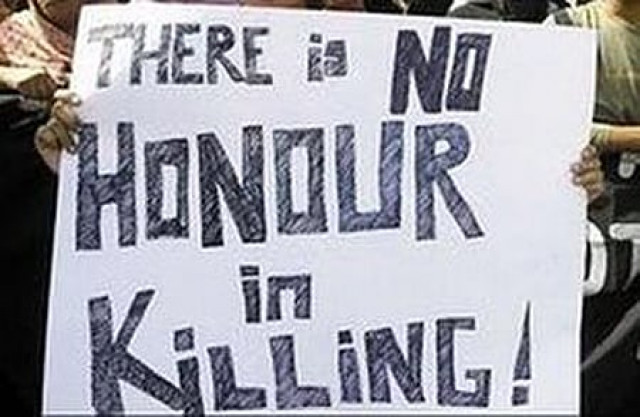The Pakistan Human Rights Commission (HRCP) registered at least 405 honor murders throughout the country in 2024. Most victims are women, often murdered by relatives who claim to defend family honor.
While hundreds of so -called honor murders are reported in Pakistan every year, often with little public or legal response, the video of a woman and a man who is taken to a remote area by a group of men to be killed has hit a nerve.
A viral video of the “honor murder” of a woman and a man in Baluchistan has lit the national outrage, which caused a scrutiny of long -standing tribal codes and demands justice in a country where such murders often pass silently.
The authorities have made at least 16 arrests in the case so far.
The video shows the woman, Bano Bibi, to be given a copy of the Sacred Koran by a man identified by the police as her brother. “Come and walk seven steps with me, after that you can shoot me,” he says, and walks forward a few meters and stops with his back to men.
The brother, Jalal Satakzai, then triggers her three times and she collapses. Seconds later, shoot and kill man, Ehsanullah Samalani.
Once the video of the murders in Baluchistan went viral, brought to the rapid action of the government and the condemnation of politicians, rights groups and clergy.
The civil rights lawyer Jibran Nasir said, however, the government’s response was more about the performance than justice.
“The crime occurred months ago, not in secret but close to a provincial capital, however, nobody acted until 240 million witnessed the murder before the Chamber,” he said.
“This is not an answer to a crime. It is an answer to a viral moment.”
Read: Brutal ‘Honor Killing’ caught in video sparks indignation throughout the country
Police arrested 16 people in the Nasirabad district of Baluchistan, including a tribal chief and the woman’s mother.
The mother, Gul Jan Bibi, said the murders were carried out by family and local elderly based on “Centennial Baluchis Traditions”, and not on the orders of the tribal chief.
“We did not commit any sin,” he said in a video statement that also went viral. “Bano and Ehsan were killed according to our customs.”
She said her daughter, who had three sons and two daughters, had escaped with Ehsan and returned after 25 days.
Bano and Ehsan were killed according to our customs
Victim’s mother
Police said Bano’s younger brother, who shot the couple, remains in general.
Baluchistan’s Prime Minister Sarfraz Bugti said it was a case of “proof” and promised to dismantle the illegal tribal courts that operate outside the law.
Police had previously said that a Jirga, an informal tribal council that issues extrajudicial decisions, had ordered the murders.
#Justiceforcouple
The video caused an online condemnation, with hashtags like #Justiceforcouple and #Honourkilling.
The Pakistan ulma advice, a body of religious scholars, described the “non -Islamic” murders and urged terrorism charges against those involved.
Dozens of members and activists of civil society rights organized a protest on Saturday in the provincial capital Quetta, demanding justice and end of parallel justice systems.
“The virality is a double -edged sword,” said Arsalan Khan, a cultural anthropologist and teacher who studies gender and masculinity.
“It can press the State to action, but the public show can also serve as a strategy to restore Ghairat, or the perceived family honor, in the eyes of the community.”
The Government prohibited honor murders in 2016 after the murder of the star of the social networks Qandeel Baloch, closing an escape that allowed perpetrators to free themselves if they were forgiven by family members. The rights groups say that the application is still weak, especially in rural areas where tribal councils still have influence.
“In a country where condemnation rates often fall into a single digit, visibility, and the uproar it brings, has its advantages,” said constitutional lawyer Asad Rahim Khan.
Read more: Three killed in incidents related to honor in Bajaur
“A Complacement State is shaken that continues to tolerate Jirgas in areas beyond its order.”
Khan said that, instead of enforcing the law, the government has spent last year weakening the Judiciary and even considering reviving Jirgas in the old tribal areas.
“It’s executive inaction, more shamefully towards women in Baluchistan,” Khan said.
Prime Minister Shehbaz Sharif in recent months has asked the higher ministers to evaluate proposals to revive Jirgas in the ancient tribal districts of Pakistan, including the potential commitment to tribal elderly and Afghan authorities.
The Prime Minister and Pakistan Information Minister did not immediately respond to a request for comments.
Viral and then forget?
Baluchistan’s murders were raised in the Senate, where the Human Rights Committee condemned the murders and requested action against those who summoned the jirga. Legislators also warned that impunity for parallel justice systems risked to encourage similar violence.
Activists and analysts, however, say that indignation is unlikely to be sustained.
“Now there is noise, but as every time, it will fade,” said Jalila Haider, a human rights lawyer in Quetta.
“In many areas, there is no court order, or application. Only silence.”
Haider said that the murders underline the failure of the State to protect citizens in sub -adjoining regions as Baluchistan, where tribal power structures fill the void that left the courts and the absent police.
“It’s not enough just to condemn Jirgas,” said Haider.
“The real question is: why does the State allow them to exist first?”




